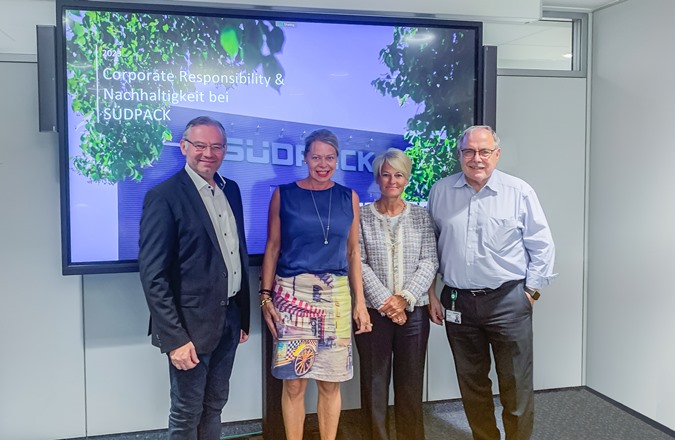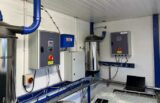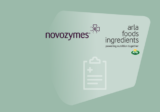Following a recent visit by Josef Rief, a member of the Bundestag for the Biberach electoral district, to the SÜDPACK offices on June 19 to learn more about a circular economy in the plastics industry, the same topic brought Norbert Lins to the site on July 17. The CDU politician from Baden-Württemberg has been a member of the European Parliament since 2014, the chair of the Committee on Agriculture and Rural Development since 2019 and is also active in the Committee on the Environment, Public Health and Food Safety. The main topics at the core of the spirited debate at SÜDPACK’s headquarters in Ochsenhausen included design for recycling, the use of recyclates in film production and chemical recycling as a complementary recycling technology.
As SÜDPACK understands it, the categorisation of the materials in terms of their recyclability is defined based on the recycling capacities within the European internal market.
Said Valeska Haux, VP Strategic Marketing, SÜDPACK: “The rapid definition of the term ‘recyclable at scale’ as well as the definition of the corresponding waste streams are a prerequisite in this case so we can continue to operate effectively and, most particularly, invest in new products and technologies.”
The current draft of the PPWR (Packaging and Packaging Waste Regulation) also includes chemical recycling as a complementary recycling technology in addition to mechanical recycling. This really hits home with SÜDPACK. Within the scope of its ZERO WASTE strategy, the film manufacturer and its cooperation partner CARBOLIQ have proven that this advanced form of chemical recycling can be used to keep plastic fractions in the loop that cannot currently be recycled mechanically. In particular, this includes multilayer films that are used for packaging products that are contact sensitive, such as food and medical goods.
Added Haux: “Compared to the thermal recycling of these plastic fractions, chemical recycling can reduce the carbon footprint by about 50 percent. When it comes to the mass balance method to be used, however, there is still no clear understanding. That is why we recommend the ‘fuel exempt’ method and already presented the proposal through CEFLEX.”
According to the PPWR, the proposed use rate of recyclates that are approved for contact with food or medical goods is ten percent. As SÜDPACK interprets the situation, food law constraints mean that this rate can only be achieved in the European internal market by using chemical recycling.
Concluded Carolin Grimbacher, Managing Partner, SÜDPACK: “CEFLEX has calculated that this would require a recycling capacity of roughly 1.1 million tons per year. At the moment, however, we do not expect this capacity to be available by 2030. It would therefore make sense to postpone the target and to first develop the necessary framework and capacities. To do so, the chemical industry will need – as will SÜDPACK within the framework of its commitment to chemical recycling – the appropriate planning and investment security. Last but not least, a mass balance approach is an essential precondition for the recognition of chemical recycling and for meeting recyclate use rates.” For more visit suedpack.com



